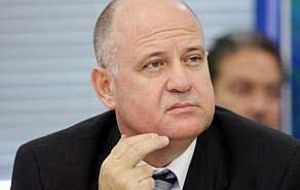MercoPress. South Atlantic News Agency
Vulnerable Brazil: 53 million people in 11 states in the dark for over four hours
 Minister Marcio Zimmerman: a total collapse of the north-eastern grid
Minister Marcio Zimmerman: a total collapse of the north-eastern grid A massive blackout left as many as 53 million Brazilians in the dark late Thursday and early Friday, the latest in a string of energy shortages that have raised questions about whether Brazil's infrastructure is keeping pace with economic growth.
Officials said a fire in a substation in the Amazon knocked out the whole north-eastern electricity grid in the region's worst blackout since 2001. The outage, which follows two other big blackouts in Brazil in as many months, lasted up to four hours in some places and brought major industries to a halt.
The blackouts come as soaring use of Brazil's old infrastructure is congesting cities and major highways, causing delays and shutdowns at some of its biggest airports, and creating chronic logjams at seaports and rail hubs.
The problems have cast doubt on the country's ability to accommodate economic growth in recent years and are prompting concerns Brazil will not be ready to host two major global sports events - the World Cup soccer tournament in 2014 and the 2016 Olympic Games.
“This is unacceptable for modern industrial production,” said José de F. Mascarenhas, head of the Federation of Industries of Bahia State, in the region darkened by Thursday's failure. “It's a disaster and it's happening repeatedly.”
Bahia's largest industry, petrochemicals, will not be able to restart for days, he added, lambasting the government for poor maintenance of transmission lines.
Meanwhile, residents across the 11 states hit by the blackout were left without air conditioning and ventilators. Many complained they could not sleep due to heat and mosquitoes.
Energy Minister Marcio Zimmerman, in comments to reporters on Friday, called the failure “a total collapse of the north-eastern grid.” He said the recent woes are “not normal” and called the second emergency meeting in five weeks.
Two previous blackouts darkened Brasília, the capital, and much of Brazil's southeast, including parts of Sao Paulo, the country's industrial and financial centre. Though some government officials sought to characterize each outage as “isolated,” both blackouts created shortages that affected consumers in areas beyond the site of malfunction.
As such, critics are once again questioning the strength of an overall system that President Dilma Rousseff, as energy minister in a predecessor government, helped oversee and which she promotes in her bid to modernize Brazil's economy.
Brazil went through a so-called “blackout crisis” in 2001 and 2002, when a drought limited the output of hydroelectric dams. In response, the government rationed electricity in certain regions, severely crimping economic growth.
While Brazil has invested heavily in electricity generation since then, it still has a long way to go. The government plans to build as many as 48 new hydroelectric plants by 2020 to keep up with the energy demands of rapid economic growth.
“If you want the economy to grow at 5% per year you need to increase provisions of electricity by 5 or 6% per year. When you don't, you end up with blackouts and that's what's happening recently,” said Neil Shearing, chief emerging markets economist with Capital Economics in London.
One sign of tight power supplies came last week, when authorities feared the grid could not cope with demand during the final episode of a popular soap opera. To be ready, they had thermoelectric plants on standby, ready to increase generation.




Top Comments
Disclaimer & comment rules-

-

-

Read all commentsThis is not a good sign for brazils government. This and the fact that they might not be ready for the 2014 world cup. It shows that if you want to have a seat in the world government, these things should be easily fixable.
Oct 26th, 2012 - 10:05 pm 01
Oct 26th, 2012 - 10:32 pm 0Power supply and complex grid in a nation of 170M “easily fixable”... You have no clue what world you landed on, do you?
Take a look at United states, and youll see what im refering to. Also, if i am incorrect about that little part, the rest of my comment stands. They are trying very hard to try and finish the stadiums before 2014, and they are very behind schedule. And this problem in thieir power grid is going to be very costly, and they should have forseen it. I know you cant predict everything, but if they took a look and thought for a second “hey is our power grid going to meet and supply our demand not only now but in the future?” they would have seen this problem before it happened.
Oct 26th, 2012 - 11:06 pm 0Commenting for this story is now closed.
If you have a Facebook account, become a fan and comment on our Facebook Page!